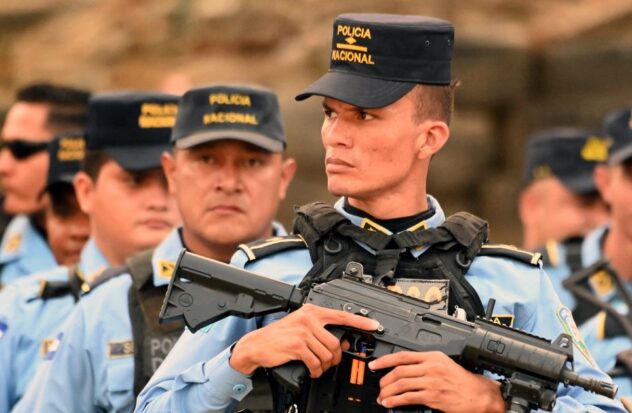“I’m looking to see if I can recover her bones. I’m coming to see if they brought her to me,” says Nolvia, 38, sitting in the Forensic Medicine office in San Pedro Sula, who out of fear uses a fictitious name, just like to identify her daughter.
Three weeks ago, authorities began excavating the side of a hill on the outskirts of that city, located 180 kilometers from Tegucigalpa.
Special agents have so far exhumed 13 skeletons from the arid land, among the undergrowth dried by the season’s harsh sun. In another nearby town they took out another one. Several clandestine gang graves have been found in various places.
Although he Xiomara Castro government imposed a state of exception in December 2022, trying to emulate the President Nayib Bukele in El Salvadorthe gangs – the largest being the Mara Salvatrucha and Barrio 18 – continue their crimes and crimes of extortion and drugs.
“With a shot in the head”
María Suyapa, Nolvia says, was in the first year of high school but, after raping her, they forced her to join a gang in Lomas del Carmen, a neighborhood of concrete and iron houses, with cement streets.
“She left her studies. They took her to live with them,” she lamented.
That is why it asks the government to act: “It can’t be that they are grabbing girls and putting them in those gangs. They are children, they have to study, they have a whole life ahead of them. “That can’t be happening,” he said.
Two years after the kidnapping, at around five in the afternoon on February 25, 2023, some gang members “took her off a bus” and she disappeared, Nolvia says about the last time her daughter was seen alive.
A few days later, the “gangsters” wrote to him on Facebook to “not look for her anymore because he would never find her.” “They told me that they had killed her with a shot to the head and she was in that clandestine cemetery,” she said.
Some neighbors, the woman continued, “saw her when they were taking her” to the hill to kill her, apparently due to an internal conflict in the gang.
Nolvia believes that María Suyapa’s remains are in the graves because she heard on the news that an exhumed skull had a bullet hole.
But the coroner Vladimir Núñez explained that “they all have a shot in the head” and they must undergo “dental or DNA analysis” tests.
The “crazy houses”
Several bones, according to authorities, belong to people who refused to leave their homes to the gang members. They are popularly called “crazy houses” when they are used for murders.
In Lomas del Carmen and other nearby neighborhoods there are “a lot of lonely houses and lots abandoned” by neighbors, says Juan, 72, who only gave his name for security reasons.
The gang members also forced Nolvia to leave the neighborhood. “They were going to kill me. They arrive with guns and say: ‘You have a few hours to leave’. You have to leave the house because if not they will kill you.”
“There are quite a few cases like this, but people don’t talk out of fear,” explained the woman, who now lives at her sister’s house.
Nolvia also feared that, if she stayed in the neighborhood, the story of María Suyapa with her other 11-year-old daughter would be repeated.
Juan estimates that “there are about 40” bones on the hill because he says that he saw many times when they took the victims and “buried” them there.
The deputy commissioner of the National Police, Enoc Funes, stated that “the operations are permanent” and dozens of police and military personnel set up checkpoints and go out on patrol.
Violence does not stop
But the violence does not stop. In 2023, Honduras registered a rate of 34 homicides per 100,000 inhabitants, almost six times the world average.
Like Nolvia, other people go to Forensic Medicine. Some hope that their missing relatives are alive, but those who know they are dead want some peace.
“Finding my daughter’s bones is the only thing I want” to find a little comfort, Nolvia resigns herself.
According to InSight Crime, violence against civilians has not decreased in Honduras, despite the state of emergency to repress gangs.
A report from the Armed Conflict Location and Event Data Project (ACLED) last December noted that contrary to what was expected, violence has spread in the country. This is believed to be caused by increased pressure on gangs in more populated urban areas.
Crimes such as extortion have expanded, according to a report on the state of exception by the Association for a Fairer Society (ASJ). In 2022, 9% of the population was affected by extortion, while in 2023 it was 11%.
InSight Crime also revealed that six months after the state of emergency was implemented, the appearance of two new groups dedicated to extortion was confirmed.
Source: With information from AFP / Insightcrime.org

